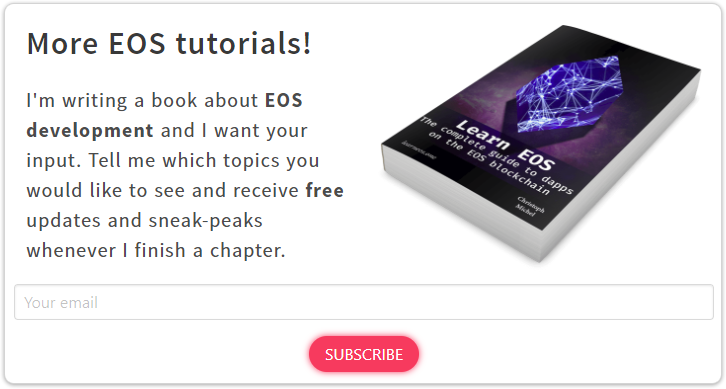How to fetch any secondary EOSIO table index using eosjs
⚠️ Since EOSIO 2.0 a lot of inconsistencies mentioned in this post have been fixed.
Understanding how to fetch EOSIO contract tables based on primary and secondary indexes is easy in theory but gets hard in practice as one needs to deal with different key types and their respective encoding. Unfortunately, eosjs does not concern itself with the encoding and leaves it up to the user. This post will go through all common key types and show how to query EOSIO tables based on them using eosjs.
An EOSIO primary key must always be a 64-bit value, an uint64_t, but secondary indexes can use many more key_types:
You can have up to 16 additional indexes and the field types can be uint64_t, uint128_t, uint256_t, double or long double. - EOSIO Developer Portal
The list of possible key types mentioned in the EOSIO Developer Portal is however not complete - there are three more key_types one can use:
i64(uint64_t)i128(uint128_t)i256(uint256_t)float64(double)float128(long double)name(name)sha256(checksum256)ripemd160(checksum160)
Often secondary keys are composite keys, i.e., the bytes of the key are the concatenation of multiple different values.
For example, LiquidApps’s dappservices accountext table defines two composite keys of type uint128_t and checksum256 involving the account, service, and provider fields:
TABLE accountext {
uint64_t id;
name account;
name service;
name provider;
// ...
uint64_t primary_key() const { return id; }
uint128_t by_account_service() const {
// account in higher bits, service in lower bits
return (uint128_t{account.value}<<64) | service.value;
}
checksum256 by_account_service_provider() const {
return checksum256::make_from_word_sequence<uint64_t>(
0ULL, account.value, service.value, provider.value
);
}
};This allows querying specific ranges of the table using the lower_bound and upper_bound options of the get_table_rows API.
As an example, one can query all ipfsservice1 service entries for the account helloworld12 (without getting any other service or account) by setting the bounds to:
lower_bound: (uint64_t)"helloworld" + (uint64_t)"ipfsservice1"
upper_bound: (uint64_t)"helloworld" + ((uint64_t)"ipfsservice1"+1)Note that secondary indexes do not need to be unique.
The above pseudo code ignores the encoding, which is important in practice and depends on each key_type.
Fetching the primary key (i64 or name)
The only available key types for a primary key are i64 and name, which is just a human-readable base32 encoding of the uint_64 value.
Let’s fetch the voter info for an account which is stored in the eosio contract’s voters table.
First, we define a helper function to fetch table rows that sets some sensible default options.
import { JsonRpc } from 'eosjs'
const rpc = new JsonRpc(`https://public.eosinfra.io:443`)
export async function fetchRows(options) {
const mergedOptions = {
json: true,
limit: 9999,
...options,
};
const result = await rpc.get_table_rows(mergedOptions);
return result.rows;
}Using name key type
When we’re dealing with EOSIO names, it’s easiest to use the name key type which allows us to pass in the human-readable account name as it is:
const response = await fetchRows({
code: `eosio`,
table: `voters`,
scope: `eosio`,
key_type: `name`,
index_position: 1,
lower_bound: `helloworld12`,
limit: 1,
});
// no upper_bound provided, need to check if owner is actually the account we queried
if(response.length > 0 && response[0].owner === `helloworld12`) {
// ...
}Notice how we couldn’t provide an upper_bound as we cannot easily infer what the “account name + 1” evaluates to using the base32 encoded representation.
Therefore, we check if the resulting row entry matches the account we queried.
Using i64 key type
Surprisingly, it seems like the above code works as well if we set key_type to i64 (or omit it in which case it defaults to i64).
This is because the chain plugin automatically notices that the bounds are not a valid integer value and does a conversion from the name type instead.
However, you’ll encounter errors when specifying bounds for account names that consist only of numbers like 111111111122 if the key_type is set to i64 because it will be interpreted as a 64-bit integer instead.
The correct way to use the i64 key type is by converting the name to its value (base32 decoding) using the following helper functions from this GitHub gist (initially defined in eosjs but removed in eosjs@2):
// ...
export function getTableBoundsForName(name: string) {
const nameValue = nameToValue(name);
const nameValueP1 = nameValue.add(1);
return {
lower_bound: nameValue.toString(),
upper_bound: nameValueP1.toString()
};
}It decodes the name to its value and returns the name and name+1 as the lower and upper bound.
const bounds = getTableBoundsForName(`helloworld12`)
const response = await fetchRows({
code: `eosio`,
table: `voters`,
scope: `eosio`,
key_type: `i64`,
index_position: 1,
...bounds,
});
if(response.length > 0) {
// ...
}This time the upper_bound is set correctly and only the account we are interested in is fetched.
The i128, i256 key types
Secondary indexes defining the i128 or i256 key types work similarly to the i64 key type with one important difference:
- The value must be provided as a little-endian hex value.
We can adjust the getTableBoundsForName function to take this case into account:
function getTableBoundsForName(name, asLittleEndianHex = true) {
const nameValue = nameToValue(name);
const nameValueP1 = nameValue.add(1);
if(!asLittleEndianHex) {
return {
lower_bound: nameValue.toString(),
upper_bound: nameValueP1.toString()
};
}
const lowerBound = bytesToHex(nameValue.toBytesLE());
const upperBound = bytesToHex(nameValueP1.toBytesLE());
return {
lower_bound: lowerBound,
upper_bound: upperBound,
};
}Fetching only the ipfsservice1 services for the helloworld12 account using the composite by_account_service key of the accountext table mentioned in the beginning (account << 64 | service) then requires:
- Little-endian hex encoding of
helloworld12 - Little-endian hex encoding of the bounds for
ipfsservice1 - Concatenating them in a way that matches the little-endian encoding of the
uint128_t
const accountHexLE = getTableBoundsForName(`helloworld12`).lower_bound;
const serviceBounds = getTableBoundsForName(`ipfsservice1`);
const bounds = {
lower_bound: `0x${serviceBounds.lower_bound}${accountHexLE}`,
upper_bound: `0x${serviceBounds.upper_bound}${accountHexLE}`,
}
const rows = await fetchRows({
code: `dappservices`,
table: `accountext`,
scope: `DAPP`,
key_type: `i128`,
index_position: 3,
...bounds,
});Note how the account is defined as the 64 higher bits and the service is in the 64 lower bits, therefore we need to put the service first when using the “least-significant byte first” structure of little-endianness.
The same idea works for the i256 type - the resulting value used for the bounds must be the hex-encoded little-endian value.
The sha256 key type
The sha256 key-type corresponds to struct checksum256 in EOSIO’s C++ code which is a 256-bit type usually used as the result of some hash computation like sha256.
Naturally, one would think the encoding would be the same as for the i256 key type - little endian.
But it is not - it uses a weird mix of splitting the checksum256 into two 128 bit numbers and little-endian encoding them.
(There’s a PR that tries to fix it, but it hasn’t been merged for half a year.)
As this stackexchange answer explains:
If you have the below hash (checksum256) returned by a row in the table (which returns a big-endian representation):
7af12386a82b6337d6b1e4c6a1119e29bb03e6209aa03c70ed3efbb9b74a290cIt’s first split into two parts (16 bytes each side):
7af12386a82b6337d6b1e4c6a1119e29 bb03e6209aa03c70ed3efbb9b74a290cThese two parts are then separately little-endian encoded (reversing every byte (2 char) chunk):
299e11a1c6e4b1d637632ba88623f17a 0c294ab7b9fb3eed703ca09a20e603bbIn the case of accountsext table’s by_account_service_provider index, mentioned in the beginning, if we interpret the index as big-endian, the conversion to the bounds we need for get_table_rows looks like this:
// return checksum256::make_from_word_sequence<uint64_t>(
// 0ULL, account.value, service.value, provider.value
// );
0ULL, account, service, provider
// convert to: (LE = little-endian encoding)
LE(0ULL, account), LE(service, provider)
// which is the same as
LE(account), LE(0ULL), LE(provider), LE(service)
LE(account), 0ULL, LE(provider), LE(service)The same query to fetch only the ipfsservice1 services for the helloworld12 account, that we did before using the i128 key type, looks like this for the sha256 key type:
const accountHexLE = getTableBoundsForName(`helloworld12`).lower_bound;
const serviceBounds = getTableBoundsForName(`ipfsservice1`);
const bounds = {
lower_bound: `${accountHexLE}${`0`.repeat(32)}${serviceBounds.lower_bound}`,
upper_bound: `${accountHexLE}${`0`.repeat(32)}${serviceBounds.upper_bound}`,
};
const rows = await fetchRows({
code: `dappservices`,
table: `accountext`,
scope: `DAPP`,
key_type: `sha256`,
index_position: 2,
...bounds,
});The float64, float128 and ripemd160 key types
I never came across a secondary index that used one of these key types.
If I do, I’ll write a follow-up post explaining their boundary encodings for the get_table_rows endpoint.
If you enjoyed this post and want to know more practical in-depth EOS articles like this one, you might also enjoy my Learn EOS Development book.


